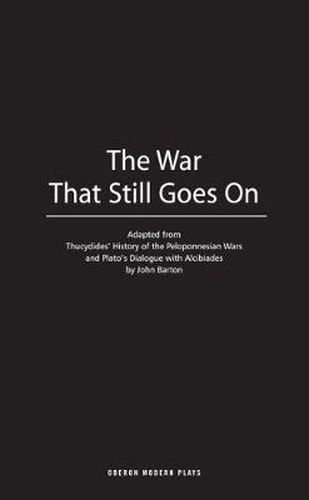Readings Newsletter
Become a Readings Member to make your shopping experience even easier.
Sign in or sign up for free!
You’re not far away from qualifying for FREE standard shipping within Australia
You’ve qualified for FREE standard shipping within Australia
The cart is loading…






Adapted from Thucydides’ History of the Peloponnesian Wars and Plato’s Dialogue with Alcibiades by John Barton
2,500 years ago, the great war between Athens and Sparta began. It lasted 27 years and involved most of the many Greek states in the Eastern Mediterranean. These shared a common language and were linked by trade and an ever-changing web of alliance.
The History of the Peloponnesian War was written by Thucydides, an Athenian general sent into exile by his countrymen. He was the first man to attempt an objective history of the political complexities of his time, and to make a model, an anatomy, of political behaviour that, he wrote, may be useful in times to come.
His method was to seek eyewitnesses for what was said and done, and to report all speakers fairly and fully. When evidence for what was said was lacking or self-contradictory, he did not hesitate to imagine the words which, as he put it, ‘the situation seemed to require’.
He died before the war ended. His book is unfinished.
$9.00 standard shipping within Australia
FREE standard shipping within Australia for orders over $100.00
Express & International shipping calculated at checkout
Stock availability can be subject to change without notice. We recommend calling the shop or contacting our online team to check availability of low stock items. Please see our Shopping Online page for more details.
Adapted from Thucydides’ History of the Peloponnesian Wars and Plato’s Dialogue with Alcibiades by John Barton
2,500 years ago, the great war between Athens and Sparta began. It lasted 27 years and involved most of the many Greek states in the Eastern Mediterranean. These shared a common language and were linked by trade and an ever-changing web of alliance.
The History of the Peloponnesian War was written by Thucydides, an Athenian general sent into exile by his countrymen. He was the first man to attempt an objective history of the political complexities of his time, and to make a model, an anatomy, of political behaviour that, he wrote, may be useful in times to come.
His method was to seek eyewitnesses for what was said and done, and to report all speakers fairly and fully. When evidence for what was said was lacking or self-contradictory, he did not hesitate to imagine the words which, as he put it, ‘the situation seemed to require’.
He died before the war ended. His book is unfinished.